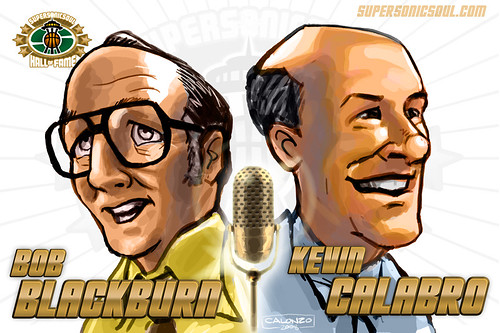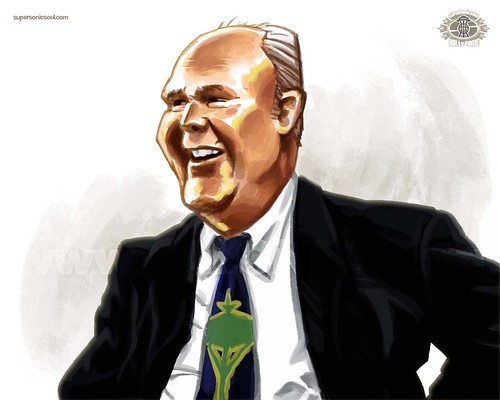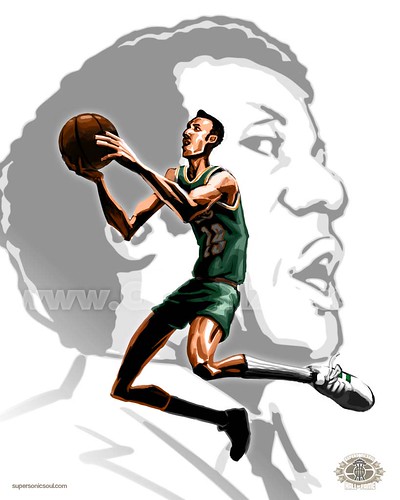
The voice tells the boy the score is close, his team has a chance. His heroes –Williams, Sikma, Johnson – will come through yet again. Tonight, he’s at the Cow Palace to extol the exploits of Teagle and Floyd, and Wednesday he’ll be at The Forum, that magical place filled with superstars the boy loves to hate. Every night, he’s talking to him from these places with names so incredible – Spectrum, Garden, Reunion, Salt Palace – they seem to have sprung forth from a Twain novel.
Each night, the announcer is the conduit for the boy. In an era before the internet, before cable, the broadcaster was your PDA, his voice your instant message.
He is Bob Blackburn, and, to a 10-year-old boy growing up in Seattle, he is a high-pitched messenger communicating from the heights of Mount Olympus.
-----
Driving through a drenching rainstorm on I-5, somewhere north of Portland and south of Olympia, a no man’s land of farms and utter darkness, the college student leaves his dial tuned to a station blasting only static. Soon, though, a voice will begin to interrupt the static, gradually becoming clearer and clearer, if only he can get close enough to Seattle to gain reception.
It’s late November, but already the season has taken on a sense of urgency and the student needs to know if his team can take down their hated Oregon rivals. He could listen to the Portland station, but, honestly, he’d rather listen to static than all that Rip City garbage.
No, he waits for his guy, his representative at the Coliseum, to tell him a bit of good news. To tell him Payton and Kemp are running like the bulls at Pamplona, Drexler’s jump shot is off, Porter is tentative.
He waits for Kevin Calabro.
----
In the field of sport-related recognition, basketball play-by-play men rank somewhere above ‘resin bag filler’ and below ‘groupie wrangler.’
Baseball has Harwell, Scully, and Caray. Football has Summerall, Enberg, and Jackson. NBA announcing’s upper echelon, though, is more famous for other pursuits (e.g., Marv Albert) than for basketball duties. Sure, there are Johnny Mosts, Bill Kings, and Chick Hearns, but as far as national renown, they rank far down the list. The most well known basketball announcers are Billy Packer and Dick Vitale, not Marv Albert and Mike Breen.
In Seattle, though, this is not the case. Kevin Calabro and Bob Blackburn are as well loved as anyone in this city, with the possible exception of the Mariners’ Dave Niehaus.
Growing up in this area back in the 80s, I was lucky enough to fall asleep on hundreds of nights with Blackburn’s somewhat nasal words echoing in my head. Sure, Calabro became the emblem of the team in the ensuing decades, but it was Blackburn who laid the foundation. His call of Gus Williams “hurls the ball into the air” at the end of the Sonics’ only world championship remains the signature utterance in Seattle pro basketball history, and the way he always brought excitement to any game, regardless of the score or the opponent, made him a continual joy.
In the years since he left the booth, Blackburn has faded from view, a relic of days gone by. For fans who grew up before Shawn Kemp arrived on the scene, though, Blackburn will always remain part of the fabric of Sonic lore.
Likewise, Calabro became as integral to the Sonic experience as Payton, Kemp, Karl, or any of the great players he covered. While even casual fans can tick Calabroisms (“Get up on that magic carpet and ride!”) off their fingers with the ease of a teacher counting heads on a field trip, it was the smaller contributions from Calabro that I appreciated more.
The majority of announcers are homers, and, to a degree, that’s just fine. After all, their listeners are certainly pulling for the home team to win, so a little rooting is certainly acceptable. Calabro, to his credit, would let you know he was delighted to see the Sonics doing well, but when they failed to perform up to their capabilities, he always let us know.
Teamed with Marques Johnson (a match made in announcing heaven), Calabro felt free to make disdainful remarks about the way the Sonics were playing. Not in a “this team is terrible and here’s why” sort of way, but in a “c’mon guys, you can do better than this” sort of way. It was that honesty made his excitement over legitimate greatness all the sweeter, and enabled him to catch on with the networks, allowing us to still hear his voice this season, albeit a voice that perhaps will never say Sonics again.
---
With the Sonics a piece of history now, I’ve often been asked by non-Sonic fans what it is I miss the most about the NBA. Is it the games? The rivalries? The daily activities?
Of course, I miss all of that, but, perhaps, what I miss the most is hearing about the team through Kevin Calabro. It’s been two decades since I first heard him tell me about Dana Barros, Derrick McKey, and the rest of the late-80s early-90s Sonics, two decades of marvelous phrases and beautiful intonations. Half my life passed in the interim, and KC has been the messenger of (mostly) good news for the majority of it. This year, though, is different. This year, I won’t have Kevin Calabro in my life.
No matter how hard I search on my clock radio.














